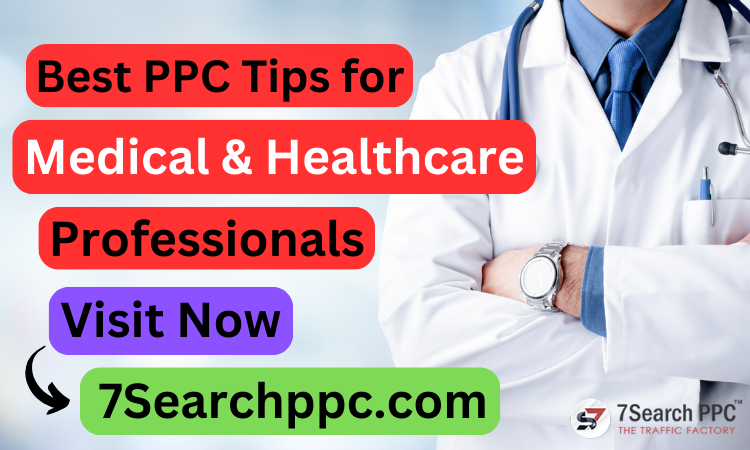Best PPC Tips for Medical & Healthcare Professionals
Best PPC Tips for Medical & Healthcare Professionals
In today’s digital age, Pay-Per-Click (PPC) advertising has become an indispensable tool for medical and healthcare professionals looking to expand their online presence and reach a broader audience. However, mastering PPC for the medical field can be challenging due to its unique characteristics and stringent regulations. In this article, we will delve into the best PPC tips tailored specifically for medical and healthcare professionals, helping them navigate this complex landscape effectively.
1. Understanding the Importance of PPC for Healthcare
PPC advertising is crucial for medical and healthcare professionals because it allows them to place their services in front of potential patients actively searching for healthcare solutions. It provides immediate visibility and can be a game-changer in attracting new patients.
2. Keyword Research: The Foundation of Successful PPC Campaigns
Thorough keyword research is vital. Identify the most relevant keywords and phrases that potential patients might use when searching for healthcare services. Long-tail keywords specific to your practice can yield high-converting traffic.
3. Crafting Compelling Ad Copy
Create concise, informative, and emotionally resonant ad copy. Highlight your unique selling propositions and benefits to potential patients. Use persuasive language that emphasizes trust and expertise.
4. Utilizing Ad Extensions to Provide Additional Information
Ad extensions allow you to provide additional information such as location, phone number, and links to specific services within your ad. Utilize these extensions to enhance the visibility of your ads.
5. The Power of Negative Keywords
Exclude irrelevant search terms by using negative keywords. This ensures your ads are shown to the most qualified and relevant audience, reducing wasted ad spend.
6. Geographic Targeting for Local Healthcare Practices
If you run a local practice, use geotargeting to display your ads to users within your service area. This maximizes the chances of attracting patients in your vicinity.
7. Mobile Optimization for a Seamless User Experience
Many users search for healthcare services on mobile devices. Ensure your PPC campaigns are optimized for mobile users, providing a seamless experience that encourages conversions.
8. Implementing Conversion Tracking
Setting up conversion tracking is essential to measure the effectiveness of your PPC campaigns. It allows you to see which keywords and ads are driving patient inquiries and appointments.
9. A/B Testing: The Key to Continuous Improvement
Regularly conduct A/B tests on your ad copy, landing pages, and keywords. This iterative process helps refine your campaigns over time, improving ROI.
10. Adherence to Healthcare Advertising Regulations
Medical advertising is subject to strict regulations. Ensure your ads comply with guidelines regarding accuracy, confidentiality, and ethical standards.
11. Budget Allocation and Bid Strategy
Determine your PPC budget carefully, allocating funds to high-performing keywords and campaigns. Use a strategic bidding strategy to maximize ROI.
12. Remarketing for Patient Retention
Implement remarketing campaigns to re-engage previous website visitors. This can encourage patients to return and book appointments.
13. Monitoring and Analytics: Data-Driven Decisions
Regularly monitor your PPC campaigns and analyze performance data. Use insights to make informed decisions and optimize your strategy.
14. Adapting to Seasonal Trends
Healthcare needs can vary seasonally. Adjust your PPC strategy to align with the changing needs and trends within the medical field.
15. Optimizing Landing Pages for Conversion
Ensure your landing pages are user-friendly and optimized for conversions. Streamline the appointment booking process to make it as simple as possible.
7Search PPC
7Search PPC is the one-stop solution for businesses looking for pharmacy advertising, and publishers who want to earn money using their websites. Our pharmacy ad network helps both of them to help achieve their goals.
Join our healthcare ad network today to enjoy our pharmacy business advertising and monetization features.
Conclusion
PPC advertising is a potent tool for medical and healthcare professionals to expand their patient base and increase their online visibility. By following these PPC tips tailored to the healthcare industry, you can create effective campaigns that drive results and help you provide quality care to those who need it.
FAQs
- What is PPC advertising in healthcare? PPC advertising in healthcare refers to the practice of paying for ads that appear at the top of search engine results. Medical and healthcare professionals use this method to attract potential patients actively searching for healthcare services.
- Are there any specific regulations for healthcare PPC advertising? Yes, there are specific regulations in healthcare advertising that must be followed. These regulations often relate to the accuracy of medical information, patient privacy, and ethical standards.
- How can I measure the success of my healthcare PPC campaigns? You can measure the success of your healthcare PPC campaigns by tracking conversions, click-through rates, and return on investment (ROI). Tools like Google Analytics can help with this.
- Should I use broad or specific keywords in my healthcare PPC campaigns? It’s advisable to use a combination of both broad and specific keywords. Broad keywords can increase visibility, while specific keywords can attract more qualified leads.
- What is the role of remarketing in healthcare PPC? Remarketing in healthcare PPC involves targeting ads at users who have previously visited your website. It aims to re-engage these users and encourage them to take action, such as booking an appointment.
#ppcpharmacyad #pharmacyAdnetwork #ppcadvertising #pharmacyads #ppcad #pharmacy #ads #ppc

